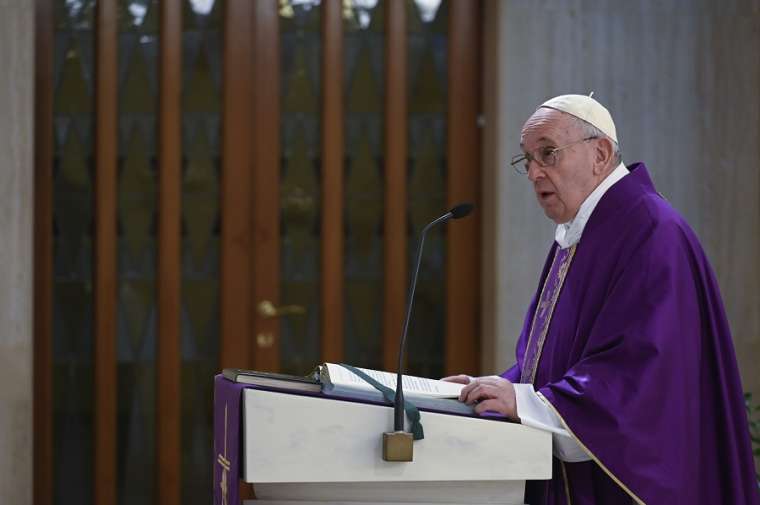Mother Teresa’s example should inspire us to seek out those whose suffering is hidden during the coronavirus crisis, Pope Francis said at his daily Mass today.
At the start of the Mass this morning, Pope Francis said he had seen a photograph in the newspaper of homeless people sleeping in a parking lot. He may have been referring to a widely circulated image of the homeless lying six feet apart at Cashman Center in Las Vegas 29th March.
“These days of pain and sadness underline many hidden problems,” he said. “In the newspaper today there is a photo which moves the heart: many homeless people from a city lying in a parking lot, under observation… There are many homeless people today.”
“We ask St. Teresa of Calcutta to reawaken in us the sense of closeness to so many people who, in society, in normal life, are hidden but, like the homeless, in a moment of crisis, are pointed out in this way.”
In his homily via livestream from Casa Santa Marta, the chapel in his Vatican City residence, Pope Francis reflected on God’s covenant with Abraham in the Book of Genesis.
“The Lord has always remembered his covenant,” he said. “The Lord never forgets. Yes, he forgets only in one case, when he forgives sins. After he has forgiven he loses the memory, he does not remember the sins. In other cases, God does not forget.”
The pope highlighted three aspects of God’s relationship with Abraham. First, God had chosen Abraham. Second, he had promised him an inheritance. Third, he had established a covenant with him.
“The election, the promise and the covenant are the three dimensions of the life of faith, the three dimensions of the Christian life,” the pope said. “Each of us is an elect. No one chooses to be a Christian among all the possibilities that the religious ‘market’ offers him, he is an elect.”
“We are Christians because we have been elected. In this election there is a promise, there is a promise of hope, the sign is fruitfulness: ‘Abraham will be father of a multitude of nations and … you will be fruitful in faith. Your faith will flourish in works, in good works, in works of fruitfulness too, a fruitful faith. But you must – the third step – observe the covenant with me.’ And the covenant is faithfulness, to be faithful. We have been elected. The Lord has given us a promise. Now he is asking us for a covenant, a covenant of faithfulness.”
The pope then turned to the Gospel reading, John 8:51-59, in which Jesus says that Abraham rejoiced to think that he would see Jesus’ day.
“The Christian is a Christian not because he can show the faith of baptism: the baptismal faith is a certificate,” the pope said. “You are a Christian if you say yes to the election that God has made of you, if you follow the promises that the Lord has made to you and if you live a covenant with the Lord: this is Christian life.”
“The sins of the journey are always against these three dimensions: to not accept the election – and we ‘elect’ so many idols, so many things that are not of God; to not accept hope in the promise, to go, to look at the promises from afar, even many times, as the Letter to the Hebrews says, greeting them from afar and making the promises today with the little idols that we make; and forgetting the covenant, living without the covenant, as if we were without the covenant.”
He concluded: “Fruitfulness is joy, that joy of Abraham who saw the day of Jesus and was full of joy. This is the revelation that the word of God gives us today about our Christian existence. That it is like that of our father: conscious of being elected, joyful of going towards a promise and faithful in fulfilling the covenant.”

